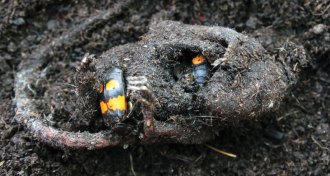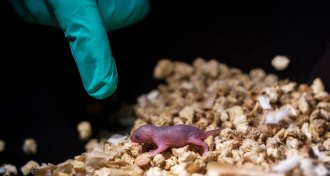All Stories
-
 Neuroscience
NeurosciencePeople who have a good sense of smell are also good navigators
A sense of smell and a sense of direction are tangled in the brain, a new study finds.
-
 Life
LifeExplore the history of blood from vampires to the ‘Menstrual Man’
Rose George’s book ‘Nine Pints’ offers readers an engaging and insightful cultural and scientific history of blood.
-
 Animals
AnimalsIn cadaver caves, baby beetles grow better with parental goo
A dead mouse — with the right microbial treatment from beetle parents — becomes a much better nursery than your average carcass.
By Susan Milius -
 Agriculture
AgricultureAdd beer to the list of foods threatened by climate change
Barley crops around the world will be threatened by drought and heat.
-
 Animals
AnimalsHow nectar bats fly nowhere
Exquisitely sensitive tech makes first direct measurements of the forces of bat wingbeats.
By Susan Milius -
 Environment
EnvironmentWe’re probably undervaluing healthy lakes and rivers
Clean water legislation often doesn’t seem like a good deal on paper. Here’s why that may be misleading.
-
 Genetics
GeneticsGenealogy databases could reveal the identity of most Americans
Keeping your DNA private is getting harder.
-
 Astronomy
AstronomyThe Neil Armstrong biopic ‘First Man’ captures early spaceflight’s terror
At a time when NASA is considering how to return astronauts to the moon, ‘First Man’ is a sobering reminder of how risky the first giant leap was.
-
 Health & Medicine
Health & MedicineHundreds of dietary supplements are tainted with potentially harmful drugs
Most dietary supplements tainted with pharmaceutical drugs were marketed for sexual enhancement, weight loss or muscle building.
-
 Tech
TechSelf-driving cars see better with cameras that mimic mantis shrimp vision
A new type of camera that sees in polarized light across a wide range of light intensities could help make self-driving cars safer on the road.
-
 Astronomy
AstronomyThe first observed wimpy supernova may have birthed a neutron star duo
Scientists have spotted a faint, fast supernova for the first time, possibly explaining how pairs of dense stellar corpses called neutron stars form.
-
 Life
LifeGene editing creates mice with two biological dads for the first time
Scientists have used CRISPR/Cas9 to make mice with two biological fathers.